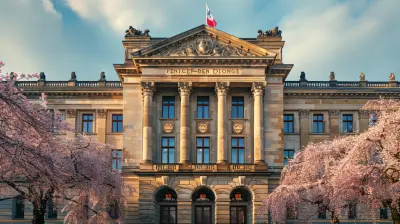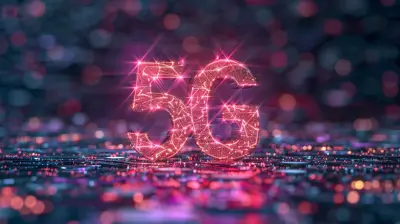Blockchain for Social Good: Solving Global Problems with Decentralization
1 August 2025
Blockchain has long been associated with cryptocurrencies like Bitcoin and Ethereum, but its potential extends far beyond digital currencies. This innovative technology is now being used to tackle some of the world's biggest challenges—from financial exclusion to corruption and even climate change.
So, how is blockchain making a difference? And why is decentralization so powerful for social good? Let’s dive in and explore how this technology is reshaping the global landscape.

What is Blockchain, and Why Does It Matter?
Before we get into the impact, let's break blockchain down into simple terms. Imagine a public ledger—one that records every transaction in a way that is secure, transparent, and tamper-proof. Instead of being controlled by a single entity (like a bank or government), it's distributed across a network of computers.This decentralization is what makes blockchain special. It removes the need for intermediaries, reduces the risk of fraud, and ensures that everyone in the network has access to the same truth. Sounds powerful, right? Well, that’s just the beginning.

How Blockchain is Driving Social Good
Now, let’s see how blockchain is being used to address social issues around the world.1. Financial Inclusion for the Unbanked
Billions of people worldwide lack access to traditional banking services. Without a bank account, securing loans, receiving payments, or even saving money becomes a challenge.Blockchain-based financial services, often called decentralized finance (DeFi), enable people in developing regions to bypass banks altogether. With just a smartphone and an internet connection, individuals can store their funds safely, send and receive money, and even access loans—all without needing a traditional financial institution.
Real-World Example:
Platforms like Celo and Stellar are helping unbanked populations in Africa and Latin America access digital financial services, empowering them to take control of their finances.2. Transparent Charitable Giving
One of the biggest concerns in philanthropy is whether donations actually reach the people in need. Too often, funds are mismanaged, lost in administrative costs, or even stolen due to corruption.Blockchain provides a transparent and verifiable way to track charitable donations. Every transaction is recorded on the blockchain, allowing donors to see exactly where their money is going.
Real-World Example:
Organizations like GiveTrack and Alice are using blockchain to bring transparency to nonprofit funding, ensuring that donations make a real impact.3. Fighting Corruption and Fraud
Corruption is a major issue in many parts of the world, especially in government contracts, voting systems, and public records. Because blockchain records transactions immutably, it can help eliminate fraud and increase accountability.For example, if governments stored land ownership records on a blockchain, it would prevent land grabs and ensure rightful ownership. Similarly, blockchain-powered voting systems could reduce election fraud by securing votes on a tamper-proof ledger.
Real-World Example:
Countries like Estonia and Sierra Leone have tested blockchain-based voting systems to increase electoral transparency.4. Supply Chain Transparency
Ever wondered whether the coffee you drink is actually fair trade? Or if your diamonds are ethically sourced? Traditional supply chains can be murky, making it easy for unethical practices to slip through the cracks.Blockchain can add transparency by tracking products from their origin to the final consumer. This way, businesses and buyers can verify ethical sourcing, ensuring fair labor practices and reducing counterfeiting.
Real-World Example:
Companies like IBM Food Trust and Everledger are using blockchain to track food and diamonds, respectively, ensuring ethical sourcing and reducing fraud.5. Decentralized Identity for Refugees and the Stateless
Millions of people around the world lack legal identity, making access to healthcare, education, and financial services nearly impossible. Blockchain-based digital identities offer a secure and verifiable way for these individuals to prove who they are.With a decentralized identity, refugees and stateless individuals can store their personal information safely, without relying on governments or institutions that may fail them.
Real-World Example:
The ID2020 Alliance is leveraging blockchain to provide digital identities to undocumented individuals, improving their access to essential services.6. Climate Action and Carbon Credits
The fight against climate change requires innovative solutions, and blockchain is stepping up. By enabling transparent carbon credit trading, blockchain ensures that companies truly offset their emissions instead of engaging in "greenwashing" (making misleading claims about environmental efforts).Blockchain-powered renewable energy trading platforms also allow communities to buy and sell excess solar power, reducing dependence on fossil fuels.
Real-World Example:
Projects like Energy Web and Veridium are using blockchain to create transparent carbon markets and promote clean energy solutions.
Challenges and the Road Ahead
While blockchain holds immense promise, it’s not a magic fix for all problems. There are challenges to address:- Scalability: Many blockchain networks struggle with transaction speed and high fees.
- Regulation: Governments are still figuring out how to regulate blockchain without stifling innovation.
- Adoption Barriers: Many people still don’t understand how blockchain works, making widespread adoption slow.
Despite these challenges, the potential for blockchain to drive positive change is undeniable. As technology evolves and its applications grow, blockchain could become one of the most powerful tools for social good.

Final Thoughts
Blockchain isn’t just about cryptocurrencies—it’s about decentralization, transparency, and creating a fairer world. Whether it's giving financial access to the unbanked, fighting corruption, or tackling climate change, blockchain is proving that technology can be a force for good.The question is: How far can we take it? With the right innovations and collaborations, blockchain could truly help solve some of the world's biggest problems.
all images in this post were generated using AI tools
Category:
Blockchain TechnologyAuthor:

Reese McQuillan
Discussion
rate this article
1 comments
Edith Flores
This article beautifully showcases how blockchain can empower communities and drive meaningful change for a better future.
August 14, 2025 at 2:21 AM

Reese McQuillan
Thank you! I'm glad you found the article inspiring. Blockchain truly has the potential to create positive impact in communities.


